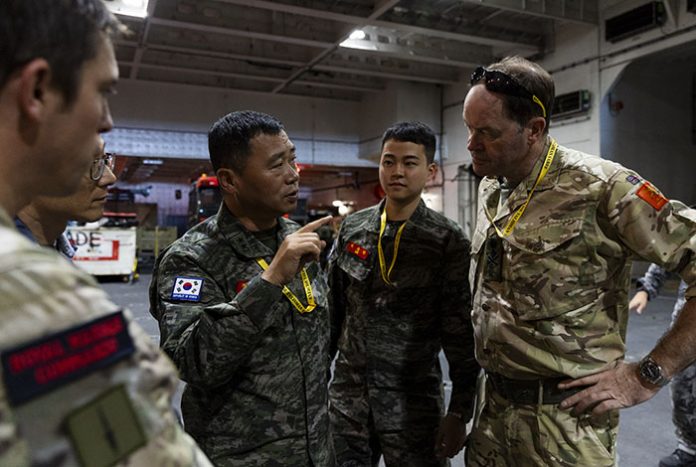“To focus on the opening stages of a conflict assumes away the critical business of theatre setting, securing access, basing and overflight; it ignores the need for light touch engagement and the importance of nurturing the human relationships that create the foundation for success if war should come. It is these relationships that are at the very heart of the British Army’s current approach to the Indo-Pacific.” – General Sir Patrick Sanders, Chief of the General Staff.
Read the digital document above or continuing reading below.
INDO-PACIFIC INSIGHT: ‘PERSISTENCE AND PRESENCE’ HAVE A MAJOR PART TO PLAY
I was delighted to be able to introduce CHACR’s Indo-Pacific Conference at the Royal Military Academy Sandhurst on the 6th September. The event presented a timely opportunity to explore the often-underestimated importance of the land component in the Indo-Pacific. Despite 80 per cent of military personnel in the region serving in armies, there is a lingering perception that the theatre will be dominated by air and maritime forces – with an associated opportunity cost for land power.
Speaking after a visit to the region, I would firstly observe that – as my Australian counterpart General Simon Stuart would rightly assert – the debate is not simply about land or maritime, but rather land and maritime.
Naturally, the balance shifts with each theatre and the Indo-Pacific is, in parts, certainly more archipelagic than continental. However, when faced with such complexity, it can be tempting to reduce the problem into a binary characterisation between domains. To my mind this is incorrect; not least as it fails to distil the character of the fight from the obvious demands of projection and sustainment.
So, conscious of this nuance, I would highlight where I believe the land component adds value to any joint force operating in the region. First, history tells us that land remains decisive – and its effects reverberate for generations. I recently met with Chiefs from Malaysia, Korea, New Zealand and Australia and it was abundantly clear that our contemporary strategic bonds are underwritten by our shared historic sacrifice, much of which was forged in the chaos of land battle.
Second, while global transactions can now be completed in a milli-second, many of the world’s goods are still transported around the planet at a speed of 20 knots. We are still subject to the ‘tyranny of geography’ – trade routes and chokepoints matter. Control of terrain matters – and nothing offers persistence and presence in doing so like land power.
Third, in framing our approach, we must look at the actions of those who challenge us in the region. It is telling that in China’s Central Military Commission, five of the six highest ranking officers are all soldiers; China’s apparent promotion of land expertise should tell us something!
And it is safe to say that the glittering vision of rapprochement with Beijing envisaged a decade ago is now a tarnished memory. The chronic systemic challenge that China poses is sadly self-evident; governments and institutions are now concluding that they can no longer ignore troubling events in the Taiwan Strait, the expansive and aggressive denial of international maritime law in the South China Sea, the ‘hidden hand’ of Chinese influence within our own institutions or the human rights violations that characterise Xi Jinping’s rule.
However, we cannot, must not, allow war with China to become a self-fulfilling prophecy, especially when strategic miscalculation remains an ever-present threat. Similarly, our approach to the region cannot just be seen through the prism of the first day of a Chinese invasion of Taiwan.
Any undue focus on Taiwan simply reduces discussion to one of anti-access, area denial and the management of nuclear escalation. Likewise, to focus on the opening stages of a conflict assumes away the critical business of theatre setting, securing access, basing and overflight; it ignores the need for light touch engagement and the importance of nurturing the human relationships that create the foundation for success if war should come.
It is these relationships that are at the very heart of the British Army’s current approach to the Indo-Pacific. This year over 700 British soldiers will have deployed across the region, working with allies and partners alike – and there is certainly scope for more engagement.
We can also look to the countless Sandhurst and Shrivenham alumni throughout the region – further evidence as to why investment in international professional military education is a critical component in ensuring the UK’s interests in the Indo-Pacific are supported. And we are extremely fortunate to be able to draw on British Forces Brunei – offering a persistence of presence that few can match. I was therefore hugely pleased that Lt Col Hugo Stanford-Tuck, Commanding Officer of 1 Royal Gurkha Rifles, shared his unique insights in the closing address of the conference.
Finally, I would just like to thank all those who participated in the event. At this year’s RUSI Land Warfare Conference I highlighted the importance of ‘mobilising our minds’ – the need to maintain the intellectual edge so vital in allowing us to meet our purpose – to protect the nation by being ready to fight and win wars on land. CHACR, together with The British Army Review, is at the very forefront of this effort – therefore I was wholeheartedly encouraged that those in attendance at the Indo-Pacific Conference took the opportunity to engage with the event’s expert panellists.





